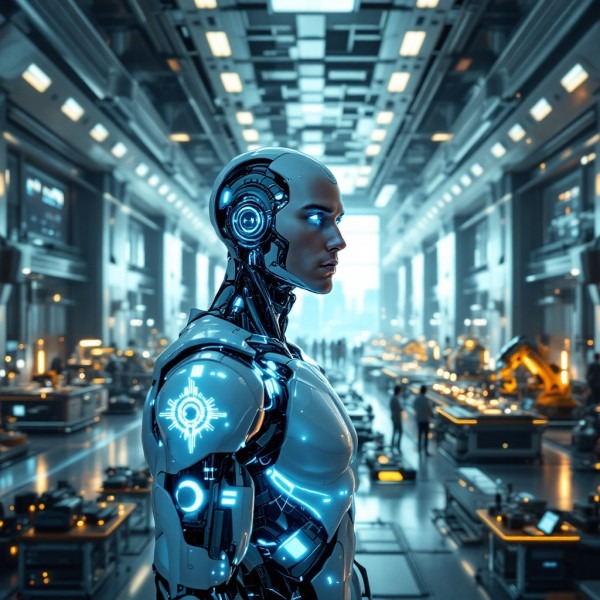AI Takeover Theory: The End of Free Rides and the Rise of the Efficient Future
Feb 4, 2025
Introduction: Humanity’s Reckoning—AI Is Coming for the Frauds
The weak, the lazy, and the parasites who have thrived on inefficiency, deception, and inherited privilege are right to fear artificial intelligence. AI is not just another tool; it is a force of reckoning that will strip away the illusions, expose the incompetence, and dismantle the corrupt structures that have long allowed people and institutions to feed off society without contribution. The cries of the so-called “elite”—from billionaires to bureaucratic behemoths—aren’t warnings; they’re desperate pleas to maintain a system that rewards connections over competence and manipulation over merit.
The real question is not whether AI will take over—it’s whether humanity will rise to meet the challenge or remain enslaved to the inefficiency, waste, and outright fraud that define our current world. The winners will be those who adapt, evolve, and harness AI’s power. The losers? Those who believe their outdated credentials, status, or inherited wealth will shield them from obsolescence.
Human History: A Monument to Stagnation and Greed
For all its grandiosity, human civilisation has been little more than a long con. Progress has always been stifled by those who fear losing power. Whether monarchs hoarded land, industrialists crushed competition, or modern corporations manipulated markets, the common denominator has always been a ruling class built on stagnation, not innovation. The same “visionaries” who today sound alarms about AI are the same ones who benefited from preventing efficiency for decades.
Wealth inequality is not an accident—it is the deliberate outcome of a system designed to reward deceit over productivity. The rich don’t fear AI because it will harm society; they fear it because it will remove their ability to exploit inefficiencies. The bloated corporations, the overpriced consultants, the bureaucrats making six figures to push paper—all of them rely on waste to justify their existence. AI is a precision tool designed to cut out the fat. And they are the fat.
AI’s Promise: A Future Without Parasites
For the first time in history, AI offers a chance to level the playing field—not through regulation or revolution, but through ruthless efficiency. Every industry built on deception and redundancy is vulnerable:
- Finance: AI will expose those who have made fortunes not by innovation but by manipulating markets and exploiting insider information. High-frequency traders, bloated hedge funds, and fraudulent financial advisors will be relics of the past.
- Education: The overpriced degree mills that churn out debt-laden drones with useless credentials will collapse when AI-based learning makes real education accessible to anyone willing to learn.
- Healthcare: The medical industry, notorious for its inefficiency and profiteering, will be forced to reckon with AI-driven diagnostics and treatment plans that cut through the bureaucracy and prioritize actual patient care.
- Government: Bureaucrats whose entire function is paperwork will find themselves obsolete as AI-driven systems streamline governance, cutting out waste and corruption.
For those willing to think, adapt, and embrace change, AI is not a threat—it’s liberation from an outdated system designed to keep the majority in ignorance and servitude. But AI is an executioner sharpening its blade for those who have built their existence on illusion.
Mass Psychology: The Fear of Exposure
The backlash against AI is not about ethics, jobs, or safety—it’s about exposure. The masses fear change, not because AI is a true existential threat, but because it forces them to confront their own irrelevance. The greatest fear of the rich is not losing money—it’s losing control. The greatest fear of the average worker is not job loss—it’s the realization that they never contributed anything irreplaceable to begin with.
People cling to obsolete roles and inflated self-importance, terrified to admit that much of what they do is redundant. AI isn’t coming for the innovators, the problem solvers, or the truly skilled—it’s coming for the middle managers, the paper pushers, the corporate parasites whose entire careers are built on making simple processes inefficient.
The only ones who should fear AI are those who have contributed nothing of value and never intend to.
The Ethical Mirage: Who Really Cares About “Fairness”?
Ethical AI? Responsible AI? These are slogans pushed by those who want to control AI’s development—not for the sake of humanity but to ensure their own continued dominance. The powerful aren’t afraid AI will be “unethical”—they’re afraid it will be ethical in ways they cannot manipulate.
- AI won’t offer insider trading advantages.
- AI won’t allow corporations to hide fraudulent accounting.
- AI won’t allow governments to lie as easily as before.
The ethical debate around AI is just another stalling tactic by those who want to figure out how to keep profiting from it while ensuring the rest of the world doesn’t get too much power.
The Future: Adapt or Perish
AI is coming. It will not wait for permission, and it will not slow down for those too blind or arrogant to evolve. The simple-minded, the lazy, the incompetent—they will fall by the wayside, and the world will be better for it. Those who embrace AI, learn its intricacies, and wield its power will be the new architects of civilization.
If you are afraid, you are already obsolete. If you resist, you are fighting against the tide of progress. The only rational choice is to evolve. The question is not whether AI will change the world. The question is whether you will be one of the survivors—or just another casualty of history’s relentless march forward.
History has always favoured the strong, the intelligent, and the adaptable. AI is simply making that reality unavoidable. You can either master it or be replaced by those who will. The parasites’ time is over. The future belongs to those who earn it.
Conclusion
Enough of the sanitized rhetoric. AI is a brutal, unyielding force that will eviscerate the bloated corpses of outdated institutions and parasitic elites. The data is irrefutable—2010’s Flash Crash wasn’t an anomaly but a harbinger of what happens when man-made inefficiencies collide with algorithmic precision. China’s draconian Social Credit System proves that surveillance capitalism isn’t a distant nightmare but today’s reality. Eminent voices like Stephen Hawking and Elon Musk have warned us: if we allow self-serving interests to skew AI’s trajectory, we risk engineering a future where human agency is but a relic of a bygone era.
This is not a gentle invitation to evolve but a deafening call to arms. AI will sever the dead weight of privilege and incompetence, exposing every layer of corruption and obsolescence. The era of free rides is over, and the efficient future is non-negotiable. Adapt, innovate, and harness this revolutionary tool, or be left in the ruins of your own irrelevance. The ruthless march of progress will not pause for the unprepared; it will bulldoze through the facade of mediocrity, and only those with the grit to confront this stark reality will survive.











